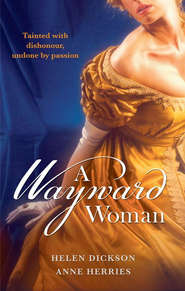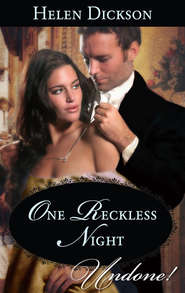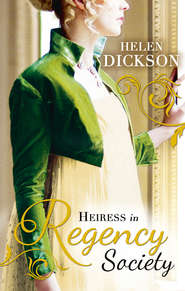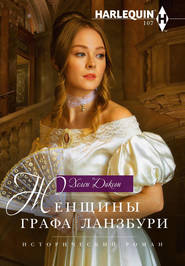По всем вопросам обращайтесь на: info@litportal.ru
(©) 2003-2024.
✖
Traitor or Temptress
Настройки чтения
Размер шрифта
Высота строк
Поля
‘Yes,’ she lied, knowing her voice sounded high and nervous, ‘but I was too far away. I—if I run I’ll catch them.’
When Lorne turned and fled, Ewan Galbraith did not urge his horse to ride on. Instead he looked at Duncan and followed his gaze, raising his eyes and focusing on what he could just make out to be a red plaid dangling over the edge of the rock concealing the cave. He looked at it long and hard before dismounting and indicating for Fergus and Lachlan to do the same, his questioning gaze coming to rest on Duncan once more.
‘The McBryde lassie has been up to something. Do you know what it is, Duncan?’
Unable to lie to his father even if he wanted to, Duncan stuck out his chest boldly. ‘Aye. She found a wounded man—one of the raiders—in the glen and hid him in the cave.’
‘Then we’d best take care of him ourselves, eh?’
When they were alone Rory turned angry, accusing eyes on his brother. ‘He isn’t a raider and you said you wouldn’t tell,’ he said fiercely, close to tears. ‘You promised Lorne. You promised,’ he cried wretchedly, wanting to pound his brother with his bare fists.
Duncan jumped down from the horse, glaring at Rory. ‘I promised no such thing. You did.’ Haughtily he strutted up the hill after his father and brothers, trying to look bold, but unable quell the feeling of unease of having betrayed Lorne’s trust quivering inside him.
Unbeknown to Ewan Galbraith or Lorne McBryde, who was running along the road to the south to await the arrival of David’s brother, hidden in a thicket high up across the glen crouched the lone figure of John Ferguson. With his eight companions murdered by the men of Kinlochalen and Drumgow, he had come down from the moor to search for the injured David.
John was no stranger to these parts, having been born and raised not far from Drumgow before going south. He knew Ewan Galbraith and Edgar McBryde, lairds of Kinlochalen and Drumgow respectively. Two of the most troublesome, incorrigible families in the Highlands, they were of a warring nature. Having been kept apart from the rest of the world within the Grampian mountains for centuries, these men considered themselves to be true Highlanders—the original possessors of Scotland—and harboured a smouldering resentment for all Lowlanders.
The Galbraiths and the McBrydes were a curse. Their names were frequently brought before the Privy Council in Edinburgh, on charges of robbery and fire raising, and they were ordered to appear before the Justices, but the order—when someone was brave enough to convey it to them—was always ignored. What might appear as criminal behaviour to the more civilised men in Edinburgh and the Lowlands, was, to the Highlanders, who were reluctant to acknowledge any authority but their own, the settlement of an affair of honour.
John had observed Lorne McBryde emerge from the small cave and scramble down the steep incline. Her bright golden hair shining like a beacon in the night made it easy to identify her. He had watched her speak to Ewan Galbraith and when she had gone that same man had immediately climbed up to the cave with his sons and dragged David down the glen to Kinlochalen. Unable to help the youth, John silently cursed Lorne McBryde, fully believing that she had betrayed David’s hiding place to the Galbraiths.
Darkness was creeping over the hills when Lorne tore her gaze away from the road to the south and dejectedly made her way back to David Monroe. She was disappointed and saddened that his brother had failed to appear and didn’t know what she could do to help the injured youth. The glen was quiet, uneasily so. With a dart of terror she climbed up to the cave. David wasn’t there. With an awful constriction of her heart Lorne knew her trust in Duncan had brought about this horror. That was the moment she began to hate him.
As she scrambled back down to the glen she saw nothing, heard nothing. Running with every nerve at full stretch, her heart and soul in her feet, she approached the village, one picture of what the Galbraiths and her own kin would do to David—might already have done to him—burnt on her brain in agony. Death stalked the quiet streets of Kinlochalen. She was too late.
A burning curiosity to see the prisoner who had been brought down from the glen had induced the citizens out of doors. They were silent, huddled in groups, but Lorne saw only David’s wretched corpse where it lay in the square by the Mercat Cross, a place where witches and adulterers were scourged. His face was upturned to the sky, as fair and perfect in death as it had been in life.
There was silence in Kinlochalen for a small space of time as the people and her father and brothers watched the small girl fall to her knees beside the youth and tenderly place her hand on his frozen cheek, her heart seized by a terrible anguish. Tears of hopelessness traced their way down her face, which she raised, fastening her accusing eyes on her father and brothers, noticing that none of the Galbraiths were present.
‘Daughter—get up off your knees,’ Edgar McBryde demanded, looking at her with bitterness and contempt.
Lorne saw the murderous gleam in his eyes, clearly angry at the compassion she showed so unashamedly for this Lowlander, but it did not frighten her. She had gone beyond that. Her small chin jutted courageously upwards and her flashing eyes met his.
‘Why? Why did you do this?’ she cried. ‘He was not one of the raiders.’
‘The lad was dead when Ewan brought him down from the glen,’ her brother James told her gently, having sensed from what Ewan had said before going home to mourn his son that Lorne had tried to befriend the youth. Once young Rory had told them the young man’s name, a name familiar to them all, they knew that as a consequence of his death, they could expect no mercy from the powerful Monroes in the south.
Galloping hooves broke the silence. Lorne scrambled to her feet and stood back when a party of about twenty men rode into the square. They stopped, their contemptuous gazes passing over the band of tough, unpolished warriors before finally coming to rest on David. Slowly the man at the head of the rest—a man accustomed to instant attention—rode forward and dismounted, going down on one knee and bowing his head over the dead youth, remaining silent for a moment as in prayer.
Without looking at those around him, he lifted the boy up into his arms and carried him to his horse. No one attempted to stop him. The implacable authority in Iain Monroe’s manner and bearing caused the Highlanders to fall back. Assisted by one of his friends, he gently placed his brother over his horse’s back and swung himself up into the saddle behind him.
Lorne moved forward, a small, slight figure in the midst of so many men. Averting her eyes from the youth whose life she had so valiantly and ardently tried to save, she looked into the face of his brother, Iain Monroe. At twenty years old, with his towering build and well-muscled chest, his hair and beard as black as jet, his brilliant silver eyes blazing with hellfire and damnation, some might say he had the face of Satan himself. Yet Lorne refused to lower her eyes or step away. It was important to her that this man should know she had meant his brother no harm and that she had tried to help him.
‘Please—wait,’ she begged him, unconsciously speaking in English and moving to the side of his horse. Her emerald eyes were awash with tears, her gaze riveted on the glittering violence in his own.
Looking down, Iain saw a child. His eyes raked her stricken face. Without taking his eyes off her he listened as one of his companions—John Ferguson, who had met him on the road and directed him to the village—leaned towards him and said something in his ear. But recalling John’s description of the girl who had revealed his brother’s hiding place to Ewan Galbraith, the gold of her hair had already told Iain who she was. Lorne watched in agony as his eyes, refusing to relinquish their hold on her own, registered his hatred, a hatred so intense that all the muscles in his face tightened in a mask.
To Iain Monroe, these Highlanders were a different species from his own, whose force of nature threatened the law-abiding civilisation of Scotland. In their tribal ignorance they conformed to no patterns of behaviour but their own. Their disdain of the rest of the world, their habits and manners, prejudices and superstitions, made them peculiar, and Iain cursed the whole lot of them to eternal damnation. But he would not be beaten by the likes of Edgar McBryde and Ewan Galbraith, Highlanders who would stick their murderous knives in your back as soon as look at you, men he vowed to see hanging from a rope’s end before he was done.
‘Stay where you are,’ he ordered, speaking with a cultured English accent, his words halting Lorne’s steps, his teeth, when he spoke, showing white and even in the midst of his black beard. He inspected her as if she were some repulsive creature crawling in the dirt.
‘I curse you, Lorne McBryde—I curse you all,’ he shouted, letting his cold eyes sweep the frozen faces of the onlookers, dwelling at length on Edgar McBryde, probing deep into his eyes, as if seeking something to weigh and to judge. His voice was awful and piercing deep, clutching the heart of every man, woman and child. Even the mighty Edgar McBryde and his sons bristled and stepped back before his icy wrath. ‘I shall make you pay for this day’s work, McBryde. You—and yours—will pay dearly. You slew my brother out of hand, unarmed as he was. Waging war on a defenceless lad is the work of mindless savages.’
Iain was right. Edgar McBryde and the men gathered around him did resemble savages. Some had thrown off their plaids and stood half-naked, bristling with arms, a wildness in their eyes, their hands and bodies bloodied from the affray up on the moor.
‘We were not to know he was not one of the raiders. He should have had more sense than to ride down the glen at such an hour. It was impossible for the men of Kinlochalen to distinguish between them in the dark.’
Omnipotent and contemptuous of his unworthy enemy, Ian’s voice was scornful. ‘Those men were under your control, McBryde—yours and Galbraith’s. Not even the plaid you disgrace can hide the fact that murder is your true vocation. You resemble a tribe of uncivilised, marauding barbarians, enmeshed in your blood-feuds and indiscriminate murder and content to remain there. The world is changing—Scotland is changing—and it will not be long before the lot of you are broken men and humbled. I—for one—am impatient to see that day.’
The square was filled with tension and a dangerous hostility in the face of Iain Monroe’s contempt and bitter condemnation for the Highlanders’ way of life. Every fibre of Lorne’s body was vibrating with her need to have him know the truth about how she had tried to save his brother. In desperation she moved to go after him when he turned his horse about, but James’s hands grabbed her, jerking her back.
‘No—stay, Lorne. It’s over. Let him go.’
She struggled in James’s grip, freeing herself and running after Iain Monroe, reaching up and grasping his bridle, her short legs moving quickly in an attempt to match the horse’s stride. ‘Please wait,’ she cried, almost choking on her sobs, so distraught was she. Halting his horse, he glared down at her and the expression in his eyes made her want to die. ‘You must listen to me. Please—I didn’t hurt him—’
‘Remove your hands from my horse,’ he seethed.
When she refused to do as he ordered, he grasped her hand and forcibly uncurled each of her small fingers, one by one, from the bridle and thrust her from him. Like a broken doll she fell to the ground, where she lay and watched him ride away, the feeling of wretchedness and defeat lying on her young heart surpassing anything she’d ever felt before.
Not until they were gone did James approach her and gently lift her up, his warrior’s heart strangely touched by her silent weeping. His sister had a tender heart moulded by every impression, a natural curiosity and a memory so retentive that whatever took place or affected or interested her was engraved on her mind for all time. He knew the impression made on her by this unhappy occurrence would remain with her for ever.
Iain Monroe remained true to his word. When the Privy Council in Edinburgh heard what had occurred in Kinlochalen they ordered the arrest of Edgar McBryde and Ewan Galbraith, intent on ridding the Highlands of these two rebellious men. Edgar escaped to Ireland and then to France, but Ewan Galbraith took to the hills and it was two years before anyone could put a rope round his neck. He was caught and taken to Inveraray, the seat of the Crown’s authority in the Western Highlands. Shackled and thrown into the Tollbooth, he was eventually hanged on Gallows Hill from the great tree.
Chapter One
1698
Astley Priory was situated in one of the most delightful settings that could be found north of York. Once a priory of the Augustinian order until the dissolution of the monasteries by Henry VIII, it was now the home of Lady Sarah Barton, Lorne McBryde’s maternal grandmother. Her father had sent her to live with her grandmother following the affray in Kinlochalen, and Lorne now considered Astley Priory to be her home where, in the care of her grandmother, she enjoyed a free and protected life.
One bright but cold morning, Lorne left the house with her cousin Agnes to take some exercise in the gardens. Since her father had been killed fighting for King William at the Battle of the Boyne in Ireland in 1690, Agnes and her mother, Lorne’s Aunt Pauline—her mother’s sister—had lived at Astley Priory. To ward off the chill, long cloaks covered their pretty dresses. With arms linked and spirits soaring, smiling broadly, they were in frivolous mood as they excitedly discussed their forthcoming visit to London. Ever since their grandmother had told them she was to take them to the capital for their nineteenth birthdays, after weeks of waiting, the time for them to leave had finally arrived.
Devoted to each other, Agnes had been just what Lorne had needed to shake her out of the sullens when she had come south, where everything was so very different from her life in Scotland. Despite her father’s and brothers’ constant blusterings and their barbarous way of life, she had missed them terribly at first. For a long time, what had occurred in Kinlochalen had been a private nightmare, painful memories that came to her in the dark like unloved friends with hostile faces and ugly smiles.
‘Perhaps we can persuade Grandmother to take a London residence,’ Lorne said gaily, feeling absurdly happy and an odd burst of pleasure at the thought of going to London, ‘then we could go there more often.’
‘She won’t. You know how she detests crowds and that awful smog, which she says makes her wheeze and her head ache. She much prefers the country.’
‘But we cannot remain in the country for ever. Perhaps if Lord and Lady Billington didn’t make us so welcome whenever we go to London, she might be persuaded. Oh, Agnes—London is going to be so exciting,’ Lorne enthused. ‘People only wake up after midnight—so I’m told. It’s a shame that when we were there before we were considered too young to be allowed out after dark.’
‘Fifteen, as I recall.’
‘I know, but this time it will be different. There will be theatres to attend, and balls where we can dance the night away and wear our best gowns.’
‘And handsome young men all vying with each other to dance with us,’ Agnes giggled, her eyes sparkling as she became caught up in the excitement of the occasion. ‘Let’s just hope that Rupert Ogleby won’t be in town—his military duties should be keeping him occupied elsewhere,’ she said, looking worriedly at Lorne, knowing the effect this particular young man’s name always had on her cousin.
The name sent a blaze of animosity jolting through Lorne’s entire body. ‘I sincerely hope he is not there,’ she replied vehemently. ‘You know what my feelings are for that particular gentleman.’
‘I do. He treated you most shamefully, and if he knows what’s good for him he won’t come within a three-mile radius of you. He almost ruined your reputation.’












